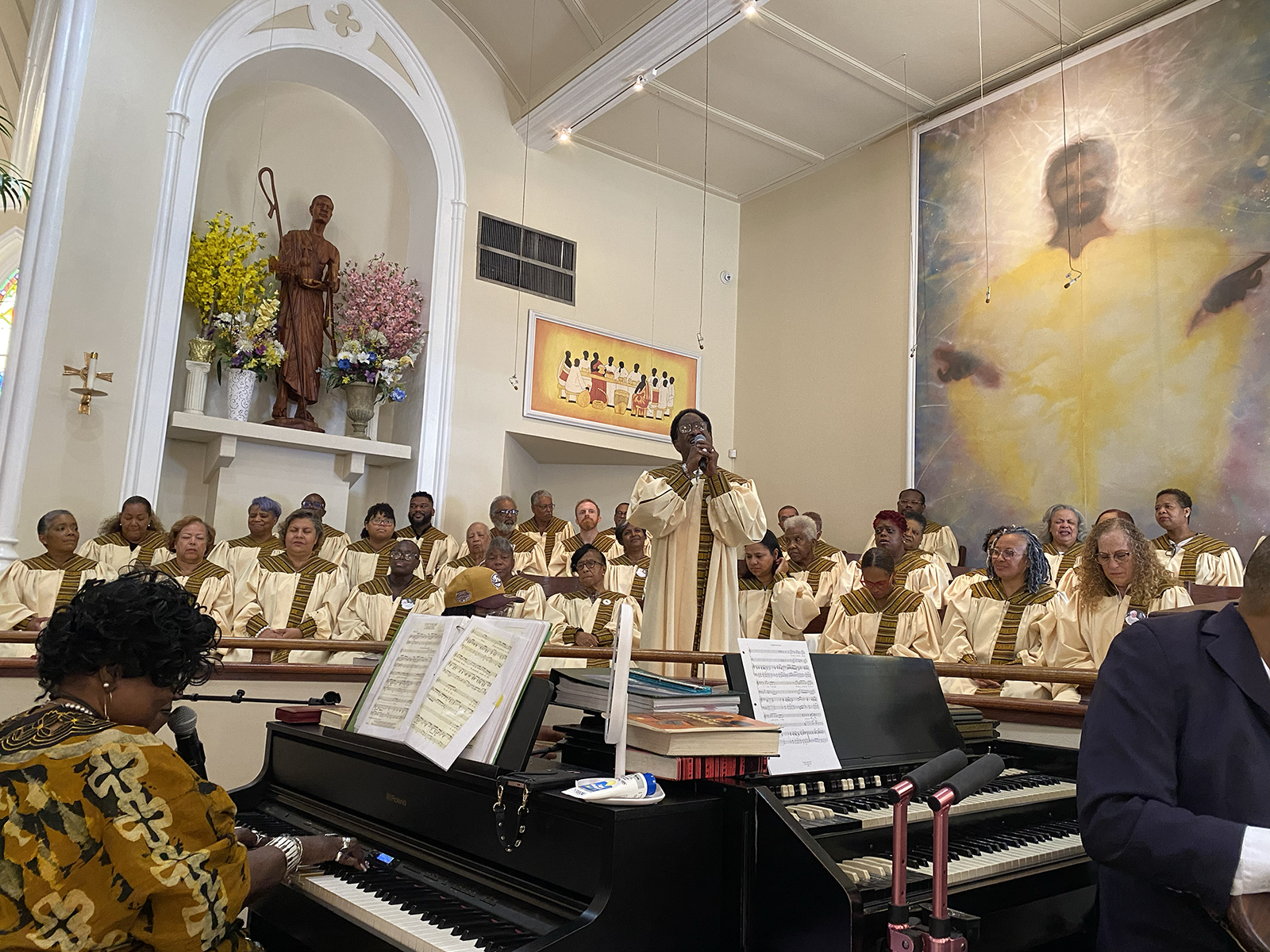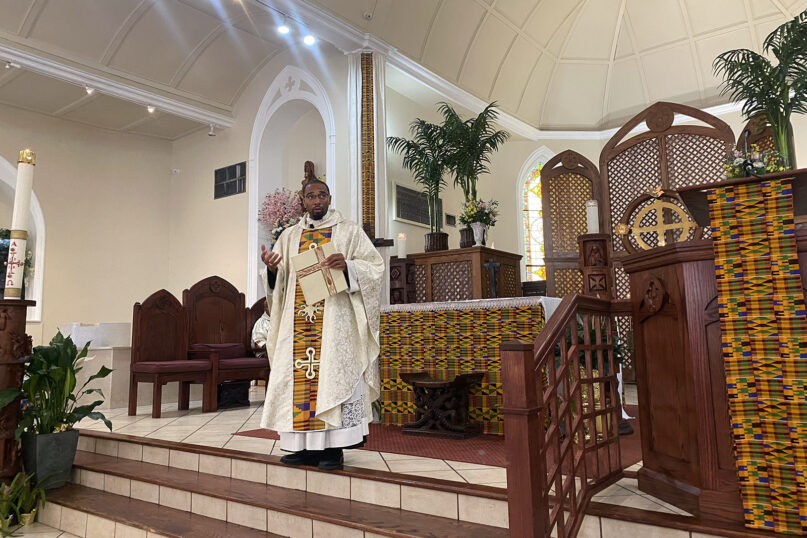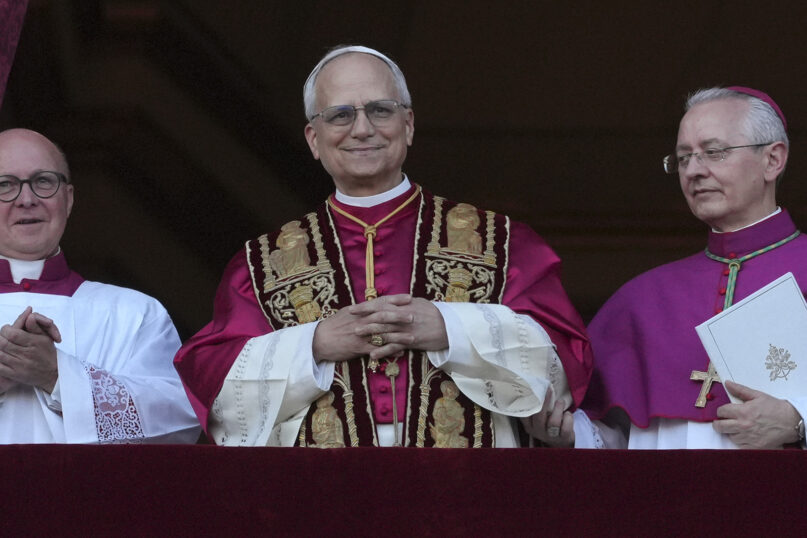
NEW ORLEANS (RNS and NPR) — Despite being born in Chicago and living most of his adult life in Peru, the first American pope has been claimed by Black Catholics in the Big Easy, who are welcoming him as family and dubbing him “Pope Leo of the 7th Ward.”
“We call him our cousin,” said Dorothy Pierce as she left Mass at St. Peter Claver Catholic Church in the Treme neighborhood on a recent May Sunday, just over two weeks after Cardinal Robert Prevost was elected as the 267th pontiff in Rome.
Gabrielle Edgerson said she thinks the pope’s brothers look like her father’s side of the family, and she joked that they may actually be cousins. Philip Soublet, too, said he was wondering if he was related to the pope. They’d all heard the news that broke shortly after his election, that Pope Leo XIV has Creole roots in New Orleans that stretch back centuries.
“You know how we all, we just claim everything from here,” Soublet said.
Even on a group text for young Black priests, one started digging and thought he, too, may be among Leo’s newly discovered family, said the Rev. Ajani Gibson, pastor at St. Peter Claver.
“The pope doesn’t know anything about this,” Gibson said, laughing. “But the number of cousins that the pope has all of a sudden has expanded.”

The Rev. Ajani Gibson in his office in New Orleans on May 21, 2025. (Photo by Rosemary Westwood)
It’s only partly a joke. The Rev. Tony Ricard, a Creole priest and the director of the Office of Black Catholic Ministries for the Archdiocese of New Orleans, said he has his answer ready if anyone asks him if the pope’s his cousin.
“My answer is, ‘Of course he is, because Creole people are connected at some point.’”
In a city steeped in Catholic history intermingled with its own colorful culture, the news of Leo’s ancestry has sparked excitement, calls for second-line parades and something deeper: a hope that this revelation will raise recognition of the contributions and history of Black Catholics in the U.S.
“We feel we have a connection,” Soublet said. “An ear that’s actually listening.”
New Orleans historian and genealogist Jari Honora discovered Leo’s Creole roots after he became curious about the pope’s surname “Prevost,” from the pope’s paternal side of the family. But it was only when looking at the pope’s mother’s family that he found the connection: Leo’s mother was born in Chicago, but her six sisters, her parents and family members going back to at least the 1740s were from Creoles of color from New Orleans, Honora said. He announced the news in a Facebook post hours after Leo’s election — and it quickly went viral.
“As late as the 1900 census, even in some of the birth records for his aunts, they are identified as colored or Black or mulatto, terms like that,” Honora said.

Jari Honora, inside the Historic New Orleans Collection, where he is the family historian, May 20, 2025. (Photo by Rosemary Westwood)
Honora, a graduate of an all-boys Black Catholic high school in New Orleans, found records of the pope’s ancestors baptized in St. Louis Cathedral over 200 years ago. The earliest baptismal record he’s found was dated 1755.
“And it was just upriver from New Orleans at Pointe Coupee, around New Roads, Louisiana, and it was an ancestor of his who was baptized Jeanette, a mulatto and slave woman,” Honora said. “In freedom, she took the name Jeanette Glapion, and she’s one of his ancestors.”
Gibson describes standing at the altar at St. Peter Claver, just a mile from where the pope’s family once lived, and praying for Pope Leo for the first time.
“I’m praying for this new pope from the United States who has roots in the 7th Ward. That was a mind-blowing moment for me,” he said.
Gibson said the pope’s Black ancestry feels like a reminder that he, too, belongs, in a church where just 4% of Catholics in the U.S. are Black.
“It provides us a happy challenge to expand how we tell our story, the fullness of our story, the joys, the pains, the failures, the victories, the trials, the tests as a part of a 2,000-year history,” said Gibson. “That we’ve been here, that we’re a part of the story. We were there at the very beginning, and we’re here now.”

The Rev. Ajani Gibson speaks during Mass at St. Peter Claver Catholic Church, May 25, 2025, in New Orleans. (Photo by Rosemary Westwood)
The Black Catholic community is hoping the election of Leo will help others recognize that too, said Ricard.
“That we belong to a church that’s universal, but they never said it had to be uniform,” he said.
For Ricard, the Black Catholic faith of New Orleans has its own culture, its own flavor, even its own soundtrack. He once went to a silent retreat carrying a boom box and headphones, to listen to his beloved gospel music. He told the nun in charge: “Sister, you pray your way. I’m gonna pray my way, we’re gonna talk to the same Jesus.”
That mix of Catholic identity and Black culture imbues New Orleans with its trademark traditions: its second-line parades and Mardi Gras, that legendary celebration that ushers in Lent. The city’s calendar is punctuated with feast days of the saints, like St. Joseph’s Day.
“Not only are there altars in people’s homes, especially in the Black and Sicilian communities, but we know that’s when the Mardi Gras Indians come out on St. Joseph’s night,” said Honora.
Even the city’s football team is named the Saints, and the emblem — the fleur-de-lis — is “not only a symbol of French heritage, but is also, in heraldry, a symbol representing the Blessed Mother,” Honora added.

Newly elected Pope Leo XIV appears at the balcony of St. Peter’s Basilica at the Vatican, May 8, 2025. (AP Photo/Andrew Medichini)
When Kathleen Dorsey Bellow first saw Leo step out onto the balcony in Rome, she thought the cardinals had elected “another European-descended pope,” she said. But now Bellow, the director of the Institute for Black Catholic Studies at Xavier University, sees an opportunity to dismantle what she calls “the umbrella of whiteness.”
“Through Pope Leo, we will be able to share a certain sense of the gift of Blackness with the whole universal church,” she said.
Sister Alicia Costa, the congressional leader of the Sisters of the Holy Family, a centuries-old order of Black Catholic nuns, believes the pope’s Black ancestors, as part of the Catholic communion of saints, could influence the ways he seeks to make change in the world. She points to his choice of name as an example — Pope Leo XIII, his predecessor, is often referred to as the “father of social teaching.” In choosing that name, Costa said, she is hoping the new Leo will stand up for the poor, for immigrants and for the environment — both around the world and in the U.S.
“We are in a bad way right now, you know, and right now I just see racism just springing up again,” she said.

A member of the well-known Mardi Gras group The Tramps holds a traditional coconut throw during the Krewe of Zulu Parade on Mardi Gras Day in New Orleans, Feb. 13, 2024. (AP Photo/Matthew Hinton)
Perhaps, in reckoning with the knowledge that he once had ancestors who were enslaved, the pope will be drawn to address the history of slavery within the church, said Nate Tinner-Williams, the co-founder and editor of Black Catholic Messenger.
“It’s something that I imagine he will eventually address as pope,” he said. “At least that’s my hope, anyway, that he’ll be able to address some of these issues and make reparation in some sort of way, or help the church make reparation.”
Henriette DeLille, a free woman of color who founded the Sisters of the Holy Family in New Orleans in 1842, is being considered for canonization — and Costa said she hoped the pope’s ties to the city could help elevate her cause for sainthood. She’s even investigating whether DeLille may have herself helped baptize one of the pope’s family members.
Others hope Leo’s lineage will have a more local impact. Outside St. Peter Claver, Veronique Dorsey, the drummer for the gospel choir, said she hopes knowing the pope is descended from Black New Orleanians could broaden the church’s appeal.
“I hope it will mean more people feel included in the church and, you know, see themselves in Pope Leo,” she said.
“Just seeing a piece of you somewhere else, where you feel like you can be represented and seen,” added Edgerson, standing beside her.
Both said they’re excited to see where Leo may lead the church. And both were already sporting Pope Leo merch: red graphic T-shirts featuring an image of the new pontiff, New Orleans style.
“It is our beloved Pope Leo of the 7th Ward. He has a nice little second-line umbrella. Got his feathers, holding a bowl of red beans and rice,” said Edgerson.
All that excitement, all that newfound closeness to the pope — and all that newfound family — also presents a new responsibility, Gibson said.
“All right, y’all,” he said. “We want to be cousins? Y’all better come to the church.”
This story was produced through a collaboration between NPR and RNS. Listen to the radio version of the story.
